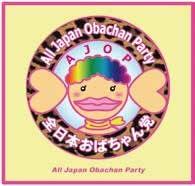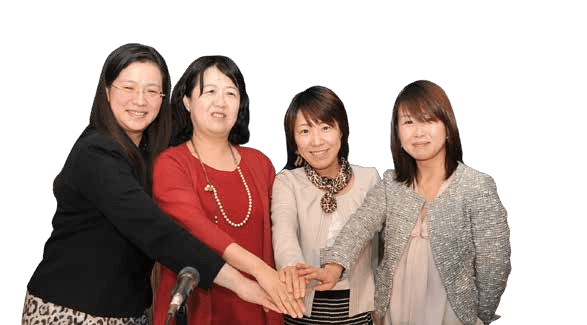Issue:

A GROUP OF DETERMINED WOMEN ARE BRINGING A LIGHT POLITICAL TOUCH TO GRAPPLING WITH JAPAN’S GENDER BIAS
Japan’s newest political movement’s members tend to giggle a lot, chat incessantly on the internet and see no reason for hiding their preference for leopardskin print clothes. They proudly call them selves the All Japan Obachan Party, or AJOP, and although they’re headquartered in Osaka (hence an Osaka obasan leopardskin trademark), they represent more than 2000 women around Japan. And they’re growing.
At a recent press luncheon at the FCCJ, AJOP Vice President Hiroko Inokuma belied the frivolous image with a serious message. “We’re aiming to increase bonding among women as the first step to getting more women involved in our movement to change Japan’s dismal record on gender equality.”
“The important point,” she continued, “is that through chatting about issues that concern women we are providing a space for a vast number of reluctant females to voice individual opinions and in so doing change their circumstances.”
Inokuma, a prolific freelance journalist who has covered women’s issues for several decades as the single mother of four children, knows what she is talking about. So do her colleagues, Dr. Tomoko Saotome, a well known Tokyo obstetrician and Kyoko Takada, an intellectual property expert, both of whom accompanied her to speak to the foreign press.
Referring to the latest blow Japan being relegated to the 110th spot in economic equality by the World Economic Forum they declared their determination to get things changed, albeit, in a different way.
Indeed, just six months after its launch, the party is making important inroads; networking on Facebook has seen the mush rooming of small AJOP groups from Hokkaido to Kyushu.
The secret, says Takada, is our “message of fun.”
A key platform of their movement, according to Takada, has been to move away from the “exclusive” image that has characterized Japan’s fore most feminist organizations. Led largely by western educated women, these groups have worked hard at raising the profile of sexual discrimination in the country and denting some traditional male dominance in the country. Still, points out the AJOP, the feminist fight tends to leave out the majority of Japanese women, particularly those living in rural areas, who have not been able to keep up the pace for various personal reasons.
Said Takada, “Instead, we want to appeal to ordinary women by giving them a voice. Our strategy is to involve as many women as we can to create an unprecedented solidarity. Only then can we have a true grassroots movement that will become a mass force for a fair and gender equal society in Japan.”
The first symbolic action was the selection of the word obachan, a bold decision in a country where the term is pregnant with negative connotations, signifying middle aged women who are resigned to being blatantly sidelined by their younger and more glamorous counterparts. Former Tokyo governor Shintaro Ishihara created a scandal in 2003 when was sued by a group of women for referring to “obachan” as “baba” (old hags), and said “old women who live after they lose their reproductive function are useless and committing a sin.”
The AJOP is meeting the negative factors head on: “We believe the original meaning of obachan in Japan signaled a kind and warm woman who worked for the betterment of her family and society,” said Takada. “So taking up this challenge is important.”

Eight issues make up the platform of the budding feminist movement including protecting workers’ rights and a commitment to politics as a way to change the future of the nation. But forming their own political party or affiliating themselves with any established organizations are not options at the moment.
Saotome, an obstetrician, explained the group’s thinking: that current politics rarely touch women’s issues as they should, which has lead to disappointment with the lack of change brought by the few female politicians in power. The preferred stance at the moment is to support gender equality policies irrespective of political party while focusing on increasing their members.
The AJOP’s administration is also striving to be flexible and transparent the president is Dr. Mayumi Taniguchi, an associate professor at Osaka University, who prefers to call herself the “acting head.” This humble leadership style, which pays respect to the movement’s founders, is badly needed to go up against the male dominated inflexible and narrow management systems in Japan that have stifled fresh thinking and created a deep rooted gender bias in society.
Sachiyo Izawa, a soft spoken nurse who joined the AJOP Tokyo group recently, attended the FCCJ lunch, and she explained her attraction to the vision of the movement and its easy approach to changing gender discrimination. “Being a nurse and a married woman in a male led society is not easy. But I joined because I am so frustrated with the system. Besides, my husband is supportive,” she said.
It is far too early to predict the future of the AJOP and its inroads into the political arena. But there is no denying the movement has a chance to raise its profile given its unusual approach to one of Japan’s most vexing problems: how to level the playing field for women, in business, in academia, in raising children and in society as a whole.
Osaka, which seems to have emerged as a breeding ground for reformist political movements, could be soon leading the feminist movement if the “Obachans” can make their leopardskin patterned messagea popular one.
Suvendrini Kakuchi is a Sri Lankan reporter for Inter Press Service, and a regular commentator for Japanese publications and television.

